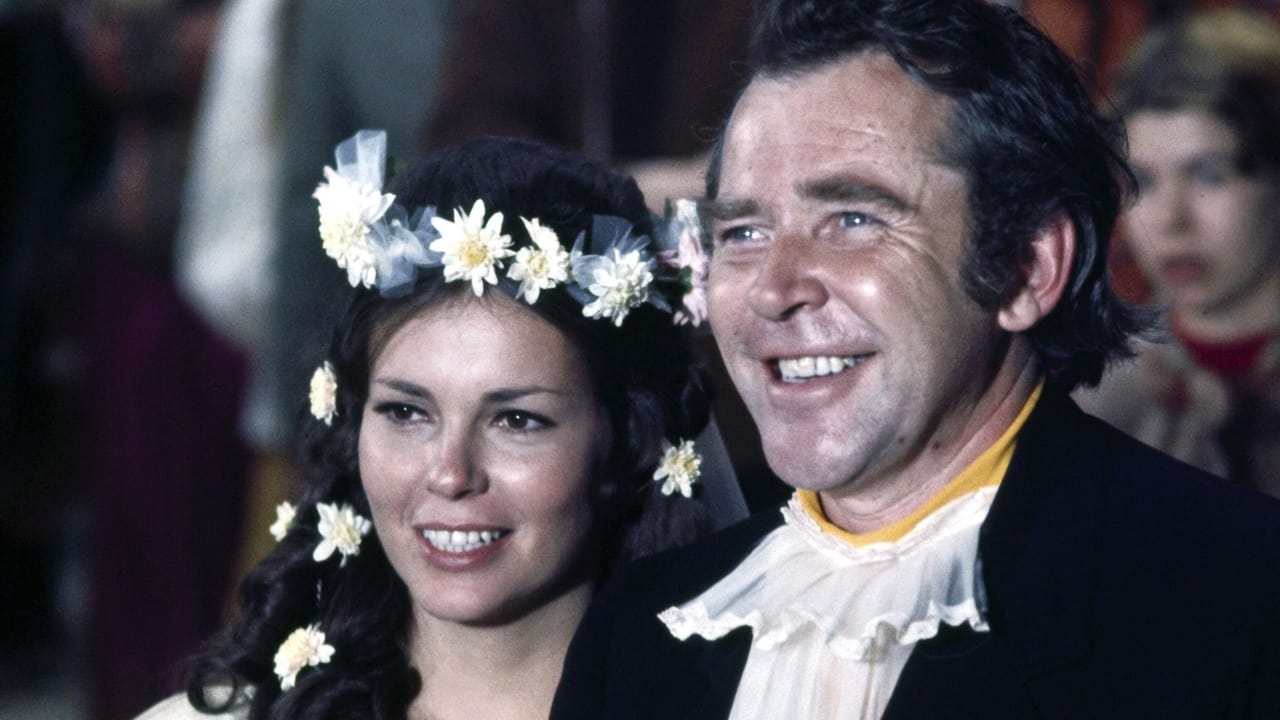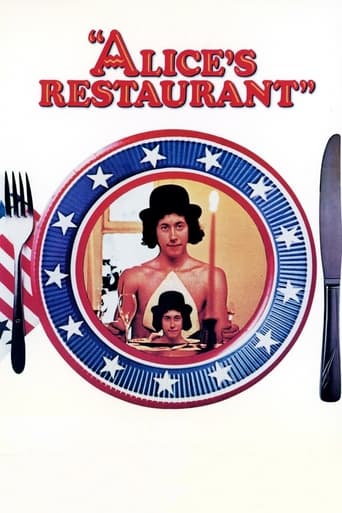

Beautiful, moving film.
... View MoreAbsolutely amazing
... View MoreThe performances transcend the film's tropes, grounding it in characters that feel more complete than this subgenre often produces.
... View MoreStory: It's very simple but honestly that is fine.
... View MoreI can almost reproduce the "Alice's Restaurant Massacree" from memory, but I never saw this film back in the day or since. I just watched it, and it was quite a surprise. It has a tone which is quite alien to Arlo's own tone as a performer at the time. Arlo sang back then as a cheerful, confident comic voice with a political subtext a millimeter below the surface, rallying the movement. The film is dark and depressing in many spots, and in the other spots it is really a scathing portrait of Arlo and (male) hippiedom as selfish privileged irrelevant sexist jerks (truthfully there was a lot of this), isolated in a land of violent intolerant yahoos. (Which means, I suppose, that most people in America in 2017 will find it relevant, since they can enjoy the negative caricatures of their enemies as long as they are willing to ignore the negative caricatures of themselves. This continued relevance is part of why I rated it as high as I did!)Jarred by all this, I looked up the film afterwards on Wikipedia and discovered that Arlo had nothing to do with the script, which was basically Arthur Penn's work. (On the other hand, he decided to act in it!) There are more parallels with "Bonnie and Clyde", considering both as crime movies, than you would think! There are a lot of notable editorial decisions, such as:So far as we can tell, the movie Arlo has few political beliefs, and wants to get out of the draft by any possible means just because he doesn't want to go.The movie starts off with Arlo fighting the draft by trying to make the Black clerk's day miserable with his snarky answers.The whole movie is framed within the months of Woody Guthrie's dying of Huntington's chorea (displaced in time, btw).To bring down the tone further, Shelly, a heroin-addicted friend of Arlo's, is invented and treated as pitiable and doomed.Ray Brock is portrayed as sexist, verbally abusive toward Alice, and verbally and physically abusive toward Shelley. (Women in general have little to say or do in this movie except sleep with the male characters. Alice is portrayed as basically reacting ineffectually to the chaos around her.)Although the title song was sung by the real-life Arlo as a rallying cry for anti-war and anti-draft mass action, none of this comes into the film at all.As an illustration of how this comes together, let's look at the key scene where Arlo and company, having found that the town dump is closed on Thanksgiving and they can't dump their microbusful of garbage there, find a bridge over a garbage-strewn streambed and throw all their garbage down there. Is it just age, or the passage of years, that makes me say, "Where do you guys get off throwing your crap in that stream?!" We then see that a comic yokel woman driving by witnesses this, is horrified, and calls the local police. Who does Penn want us to sympathize with here? Possibly we are supposed to just feel superior to everyone. Frankly I think the police chief had the last laugh in portraying himself in this movie, possibly realizing that most people, left and right, are glad he found out who illegally disposed of that rubbish.The movie ends with the newly-married Alice standing all alone in her wedding dress for an extended take, possibly just reflecting on the miserable world she lives in and the miserable people in it. I don't think the sixties were that hopeless a period, but Penn possibly wasn't the guy to find out where the hope was.
... View MoreBased on his folk song, Arlo Guthrie plays himself. He's facing the draft and joining the counter-culture. His father is in the hospital with dementia. He encounters and befriends various people. He and his friend are arrested for a massive case of littering but they get off easy as the blind judge fails to see the evidence. He's called up for the draft but his littering conviction keeps him out of the war.Arlo Guthrie and his song come from a time and place. I'm not familiar with it. I'm sure there is great meaning to some of this film. I'm not privy to it. To me, it's simply a rambling journey following a less-than-charismatic lead. He's not really an actor. He's playing himself in the most casual way. This is a time capsule of a certain time. It meanders too much to be a compelling narrative but it does have some interesting aspects. It's respectful of the counter-culture. There are a few funny cute moments. The second half is more surreal and therefore much better. This is one weird movie.
... View MoreThis film is a high point of the alternative 60's cinema, that marked the end of that decade through films such as: "Head", "Trip","Bonnie & Clyde", "Blow-Up", and most notably "Easy Rider". This portrayal of rock'n'roll, free wheelin' lifestyle, is differently put in each of these movies, but Alice's restaurant is special. This is the movie not out of the novel or a short story, but out of a song, popular "Alice's Restaurant Massacree" by Arlo Guthrie, and it plays well on screen too. It's tripy, it's funny, and funny in a way that only life can direct it to be, it's political, but gently so, and it's making a point. A point about life, a point about music, a point about society and war, and most importantly a point about drugs. This picture is one of it's kind, and it will never fade with age. Arthur Penn did a good one here as well, and it probably came out the way it did because of Penn and Guthrie, and their unique talents combining. Brilliant!
... View More1969 was a turning point in American history. And this film is still living on the hippie dream, on the flower kids and their illusion that life is nothing but music and fun. Even the war and the draft are made small and insignificant, as if you could escape the draft because you had been arrested, tried and convicted of a crime like littering. Why not jaywalking? 1969 was the arrival of Nixon, the invasion of Cambodia, after the Tet offensive, escalation and blindness among all political personnel or politicians. The film thus is a full nightmare in disguise as a freewheeling period of complete enjoyment and happiness, wedding and champagne added as a reward for your trust in the future. And yet the film is a tremendous satire of that very short-sighted and careless spirit. Every detail is symbolical and metaphorical. Arlo Guthrie's girl friend looks very Vietnamese, a symbol of the war going on that no one wants to see. The church that is sold is also the symbol of the loss of faith and legitimacy in the US. Everything is just running down and away. And that is crowned at the end by this very last scene where Alice and Ray are literally abandoned by Arlo and Mari-chan, and Alice is not standing in any Wonderland then, but in her wedding dress, early in the sunless morning on the front steps of the church of hers, unmoving and silent in a world where there is a light breeze that makes her veil float slightly, both the veil and its shadow on the church wall, and Alice and the church are captured by the slowly moving camera following some circle whose center is Alice herself and every so often a tree trunk goes by in the picture, and the whole church is surrounded by a complete waste land, all dirt and no grass, brown and muddy. The church itself looks unkempt and its paint seems to be more or less starting to scale. A world abandoned and being wasted, wrecked, dumped along the way of history that is going to come, a vision we can imagine bleak and sad, tearful and fearful, frightening and full of pain. There is like some nostalgia at that time about a good old world that has vanished in thin air and will never be back. See you, bye bye, forever. That was a time when the United States, for the first time in their history, had met an obstacle they could not negotiate. And today this past vision is becoming so premonitory of the forty years it will take for hope to come back in time to be able to assume the changing world in which the US are no longer to be number one and yet when they can recapture some leadership provided they accept to share responsibilities and resources. That idea of sharing definitely was not in the air in 1969 and the dissatisfied young people could only dream of a freewheeling enjoyment of what was at their disposal without any effort of any kind. And the vice-principal of my high school was telling us in the car that took us to the Teachers' Union state convention in Charlotte, North Carolina, how a simple atom bomb on Hanoi or ,Haiphong would bring in victory. The higher the monkey climbs in the tree You know the second part of the saying I guess, if not go and check in Sri Lanka, for instance, what you can see when the monkey is going up into the tree leaving you on the ground, your eyes rising slowly to follow the butt sight of the acrobatic animal.Dr Jacques COULARDEAU, University Paris Dauphine, University Paris 1 Pantheon Sorbonne & University Versailles Saint Quentin en Yvelines
... View More